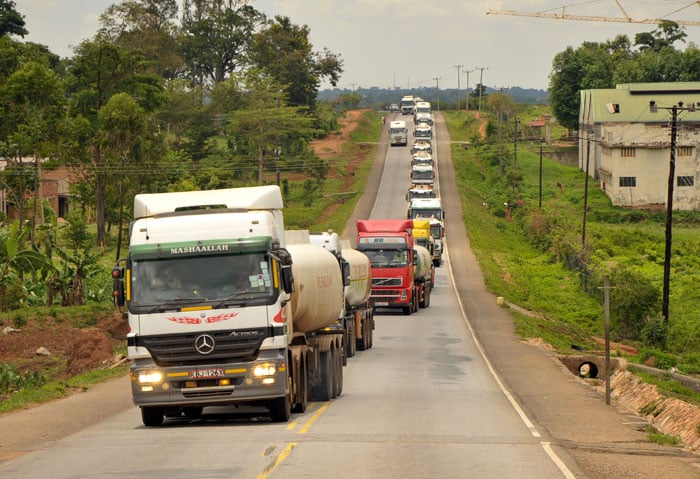How inexplicable charges will make petrol costlier in Uganda

Fuel trucks from Malaba border. Uganda National Oil Company (Unoc) assumed full responsibility for the importation of petroleum products into the country. PHOTO/ MICHAEL KAKUMIRIZI
What you need to know:
- President Museveni had last year blamed the high fuel prices in Kampala on ‘middlemen’ in Kenya’s government-backed fuel importation deal.
- Uganda then signed a five-year deal with Vitol Bahrain.
Unexplained higher pipeline and logistics costs will see super petrol cost more in Uganda than Kenya, thwarting Kampala’s goal of sourcing cheaper oil by ditching Kenya to buy the products directly.
A comparison of the freight and insurance premiums shows that Uganda is paying Vitol Bahrain $81.50 per tonne of super petrol compared to the $90 per tonne that Kenya agreed with three Gulf oil majors under a Government-to-Government (G-to-G) deal.
However, Unoc’s has included higher logistics charges at $36.92 per tonne, compared to the $28.03 per tonne that Kenya pays under the G-to-G deal.
Additionally, Unoc’s has indicated pipeline charges of $57.38 per tonne, higher than the $45.93 per tonne that the Kenya Pipeline Company’s (KPC) charges. This raises the questions on why the pipeline charges are higher than what KPC is charging and who pockets the money.
President Museveni had last year blamed the high fuel prices in Kampala on ‘middlemen’ in Kenya’s government-backed fuel importation deal. Uganda then signed a five-year deal with Vitol Bahrain.
Currently, a litre of super petrol is retailing at the same rate in both Nairobi and Kampala, highlighting the direct effect of Kenya’s G-to-G deal on the cost of fuel in Uganda.
“Why is Unoc’s price higher than Kenya’s Government to Government deal?” posed one of the oil marketing companies in the neighbouring country posed in its analysis of the pricing build-up.
The analysis brings the price of Uganda’s petrol to $990.29 per tonne, $9.82 higher than Kenya’s $980.47 for the same quantity of the petroleum product.
Unoc is yet to make public the price build-up for the maiden diesel cargo that arrived at the port of Mombasa alongside super petrol.
Ugandan Minister for Energy and Mineral Resources Ruth Nankabirwa has already warned of the shocker that Ugandans should expect when the country starts calculating pump prices based on its import deal with Vitol Bahrain.
The pipeline charges are for moving fuel from KPC’s facilities in Mombasa to the Eldoret depot, from where the Unoc’s cargoes are trucked to Kampala.
Uganda had last year said that its deal with Vitol Bahrain would ensure lower pump prices in Kampala, by edging out the ‘middlemen’ in Kenya’s G-to-G deal.
Kenya signed the deal with Saudi Aramco, Abu Dhabi National Oil Company, and Emirates National Oil Company (Enoc) for the supply of fuel on credit for 180 days per consignment.
*Written by John Mutua



